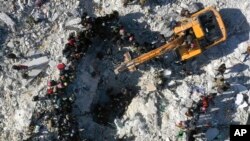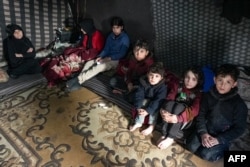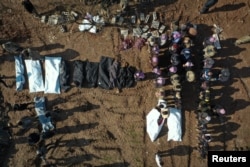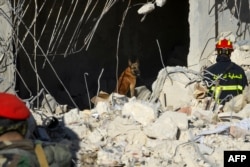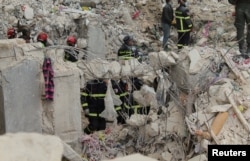The recent rescue of two children from the rubble of collapsed buildings in Idlib and Aleppo in northwest Syria is a rare bit of good news in an area devastated by the massive earthquake that struck southern Turkey and its northern neighbor Monday.
While a huge humanitarian operation is slowly gathering steam in Turkey, similar efforts in Syria are barely able to get off the ground.
Logistical problems brought on by more than 12 years of crisis and conflict, the crippling impact of unilateral sanctions, and the reluctance to support the government of President Bashar al-Assad, who is widely reviled as a war criminal, are some of the limiting factors.
Jens Laerke, a spokesman for the Office of the Coordination of Humanitarian Affairs, or OCHA, warns that political tensions between Turkey and its northern neighbor could compound the difficulties for aid workers to adequately respond to the crisis in Syria.
"It is imperative that everybody sees this as a humanitarian crisis because that is what it is," he said. "Please do not politicize any of this. Let us get the aid out to the people who so desperately need it."
Laerke noted the earthquake temporarily has stopped the cross-border aid operation from Turkey to Syria, preventing essential relief from getting through.
That operation has been overseen by the United Nations since 2014. It has been a lifeline for some 4 million people in Syria's rebel-held northern territory, because aid convoys from government-controlled areas do not cross the conflict line.
An estimated 23 million people reportedly are affected by the 7.8 magnitude earthquake, the most powerful to hit the region in almost 100 years. While the latest reports put the number of people killed at more than 11,000, the World Health Organization says it expects the death toll to rise to about 20,000.
Children are most at risk, according to James Elder, UNICEF spokesman. "When we hear the official numbers, UNICEF fears that the earthquake that hit southeast Turkey and northern Syria may have killed thousands of children."
"They went to bed as normal, they were woken by the screams of their neighbors, by broken glass, and by the terrifying sound of crumbling concrete," he said.
Before the earthquake struck, Elder said children in the region already were in an emergency and in need of humanitarian support. "Many, many children in that part of the world in northwest Syria are facing a cholera outbreak, a brutal winter, and a vicious conflict. This earthquake, of course, is simply unimaginable hell for them."
UNICEF is using its limited funds and supplies to provide safe drinking water and sanitation services, to identify unaccompanied children, and to provide as much education and psychological help as possible, Elder emphasized.
Turkey is home to more than 3.5 million Syrian refugees, nearly half of whom are living next to residents in the 10 provinces most affected by the earthquake, the UNHCR said.
It is providing tents, mattresses and whatever else the government requests to both Turkish nationals and refugees.
Syria's 12-year-long civil conflict has displaced more than 6.8 million people inside the country. More than 4 million in northwest Syria need humanitarian assistance, the majority of whom are women and children.
The U.N. High Commissioner for Refugees has relevant core relief supplies in stock and "has already started distributing desperately needed relief items such as blankets, mattresses, plastic sheeting, thermal blankets, and tents," said Matthew Saltmarsh, a UNHCR spokesman.
He noted that some of the areas that were struck by the earthquake are in remote and hard to reach areas, "and the severe winter storms hitting the region are adding to challenges to the efforts to reach those impacted."
The International Federation of Red Cross and Red Crescent Societies is supporting the Syrian Red Crescent, which is playing a pivotal role in search and rescue operations in northwest Syria and in providing life-saving support and emergency medical care to those affected by the disaster.
The federation has just launched an appeal for more than $200 million to respond to the deadly earthquake in Turkey and Syria, and other aid agencies are expected to follow suit.
The U.N. Syria Commission, which has been investigating alleged violations of international human rights law in Syria since March 2011, is calling for a comprehensive cease-fire to enable humanitarian workers and rescuers to reach those in need without fear of attacks.
"Many Syrians are now without shelter among collapsed buildings, in the rain and the snow, amid freezing temperatures with untold numbers trapped beneath the rubble," said Paulo Pinheiro, chair of the commission.




